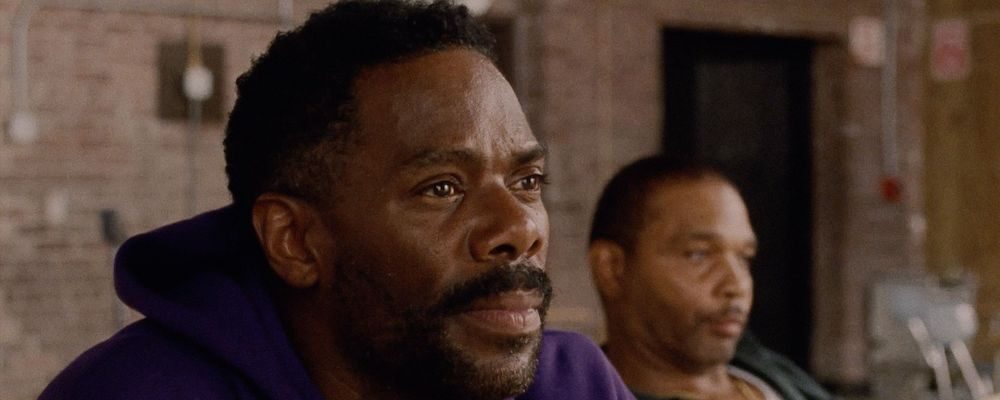‘Sing Sing’: Colman Domingo Leads a Compelling True Story About a Band of Inmate Thespians
Alci Rengifo
Art, like freedom, is something that we tend to take for granted. We can forget its real merit until it becomes an element of sheer survival. “Sing Sing” beautifully captures the experience of holding on to an art form to simply live. Greg Kwedar bases the film on a 2005 Esquire article, “The Sing Sing Follies,” by John H. Richardson. The article chronicles the impressive feat of a theater arts program at New York’s Sing Sing prison on the Hudson River. Kwedar could have turned this into an easy tear-jerker designed to be released in the fall as Oscar bait. But like a filmmaker as passionate as his subject, the director and team construct an immersive experience that steps into the very world of its characters.
Colman Domingo is Divine G, a Sing Sing convict serving time for a murder he claims he did not commit. For years, Divine G has been one of the leaders of a theater program at the prison, where volunteers sign up to stage a new production every six months. A true theater devotee, whose acting dreams were derailed by bad choices, Divine G takes the task seriously and writes plays in his cell. A new member soon joins the troupe, Divine Eye (Clarence Maclin), a rougher type who muscles other inmates for drug money. Surprisingly, it is Divine Eye who insists to the rest of the group that they make a comedy this time around. The head of the project (Paul Raci) agrees and writes up a surreal trip combining everyone’s suggestions, from Egyptian kings to Freddy Krueger. Putting it together will entail Divine Eye discovering what acting truly means and Divine G facing his own highs and lows.
The first great detail in “Sing Sing” is that Kwedar surrounds Domingo with actual inmates who have gone through the real theater program. Divine Eye and most of his fellow thespians have all been part of the real troupe. No wonder this film has such a piercing authenticity. Domingo never feels out of place because he’s perfectly cast as the inmate with a sophisticated, artistic air, which is of course a mask for the despair of being imprisoned. He’s taken aback when Divine Eye beats him to the section of the surreal play that features Hamlet’s soliloquy. Paul Raci also fits in perfectly as the group head who doesn’t flinch in directing convicted men in the ways of loosening up, showing vulnerability and doing exercises to tap into their sillier, freer sides. For these inmates, this is a chance to be human again away from the brutality of this place, where guards ransack your cell at will and drug dealers impose their own rules.
“Sing Sing” marks a true elevation for Kwedar, who works from a screenplay by Brent Buell and Clint Bentley. Kwedar co-wrote Bentley’s own excellent directorial effort, “Jockey.” They are fascinated by the lives of people within their own environments and vocations, always eloquently. Kwedar’s last film, “Transpecos,” was an evocative indie about border agents caught in a triangle of betrayal and drug running. Made by A24 with greater resources, “Sing Sing” is less about the twists and more about observing these lives function through the community of their theater group. Each performer has their story. Sometimes it can be read on the face of someone asking Divine Eye not to bring his guarded, jail yard ways into rehearsals, reminding him everyone in here has seen violence. The text slowly begins to penetrate and it’s truly inspiring to see Divine Eye eventually recite Shakespeare’s lines with a natural, fierce talent.
For Colman Domingo, this is another awards-worthy performance in a career that keeps piling them up. His usual, keen intelligence is on display but with sharp, subtle emotional waves. Divine G is so self-assured in the first act, finding himself almost in competition with the surprisingly talented Divine Eye. He is also a legal expert who starts consulting the tougher felon on his appeal process, even as he tries to secure evidence for his own shot at freedom. There are demons stirring in his memory kept at bay. His talent alone can’t fully protect him from the threat of violence or the cruel ways of the system. Unconstrained by some predictable plot, Domingo is allowed to just flow with the rhythm of the movie. This makes the process of understanding the craft the inmates are learning clearer and more intimate. In a sense, these guys are all already condemned, so learning how to convey comedy and emotions is the central plot of their existence.
The great universal message of the film becomes the democratic nature of art. During the end credits, we get real footage of the Sing Sing theater troupe’s performances. How close the film captures the experience is revealed as something uncanny. There they are, people who never imagined being on a stage bringing satire and drama to life. They dance and perform in Egyptian garb and other lively wardrobe. We need art to make sense of a mad world. The characters of “Sing Sing” may be behind bars, yet we can find ourselves in other forms of social and personal prisons on the outside. Without expression, what are we? Divine Eye taps into Shakespeare’s language because it explores power, revenge and the eternal question of to be or not to be. That is the great question facing everyone, and us, in this wonderfully human movie. Even if fame and fortune are never achieved, we still need art to exist and know ourselves.
“Sing Sing” releases Aug. 2 in theaters nationwide.

